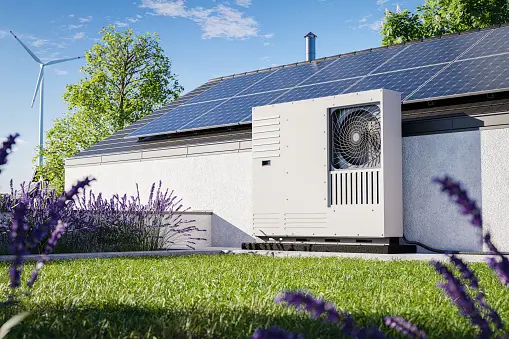As energy costs rise and environmental concerns grow, more homeowners are turning to solar heating systems as a sustainable and cost-effective solution. Solar heating systems harness the sun’s energy to provide heat for domestic use, significantly reducing reliance on fossil fuels and lowering utility bills. This comprehensive guide explores the cost, efficiency, and installation of solar heating systems, providing valuable insights for anyone considering this eco-friendly technology.
Understanding Solar Heating Systems
Types of Solar Heating Systems
Solar heating systems come in two main types: passive and active. Passive solar heating relies on the design and materials of a building to collect and store heat naturally. This method requires no mechanical devices and is often integrated into the architectural design. Active solar heating systems, on the other hand, use mechanical devices such as pumps, fans, and controllers to circulate heat. These systems typically include solar collectors, a heat storage unit, and a distribution system to transfer heat to the desired areas.
How Solar Heating Systems Work
Active solar heating systems operate by capturing solar energy through collectors, typically installed on rooftops. These collectors absorb sunlight and convert it into heat, which is then transferred to a heat storage unit, such as a water tank or thermal mass. The stored heat is circulated throughout the home using pumps or fans, providing consistent and efficient heating. By leveraging the abundant energy of the sun, these systems can significantly reduce the need for conventional heating methods.
Cost of Solar Heating Systems
Initial Investment
The initial cost of a solar heating system can vary widely depending on the size of the system, the type of collectors used, and the complexity of the installation. On average, a residential solar heating system can range from $5,000 to $10,000. While this may seem like a significant investment, it’s important to consider the long-term savings on energy bills and the potential increase in home value.
Long-Term Savings
One of the primary benefits of solar heating systems is the substantial long-term savings they offer. By reducing or eliminating the need for traditional heating methods, homeowners can save hundreds or even thousands of dollars annually on energy bills. Additionally, many regions offer incentives, rebates, and tax credits for installing solar heating systems, further offsetting the initial costs. Over time, the savings can far exceed the initial investment, making solar heating a financially sound decision.
Maintenance Costs
Solar heating systems are known for their durability and low maintenance requirements. Routine maintenance involves periodic inspections to ensure the system is functioning correctly, such as checking for leaks, cleaning the collectors, and verifying the operation of pumps and controllers. These tasks are generally straightforward and infrequent, resulting in lower maintenance costs compared to conventional heating systems.
Efficiency of Solar Heating Systems
Factors Affecting Efficiency
The efficiency of a solar heating system depends on several factors, including the type of collectors used, the system design, and the geographic location of the home. Flat-plate collectors and evacuated tube collectors are the most common types, each with varying degrees of efficiency. Flat-plate collectors are suitable for moderate climates, while evacuated tube collectors are more efficient in colder climates due to their superior insulation properties.
Maximizing Efficiency
To maximize the efficiency of a solar heating system, it’s crucial to optimize the placement and orientation of the collectors. Ideally, collectors should be installed on a south-facing roof with minimal shading to capture the maximum amount of sunlight. Additionally, incorporating energy-efficient building practices, such as proper insulation and sealing, can enhance the overall performance of the system. Regular maintenance and monitoring can also help ensure the system operates at peak efficiency.
Comparative Efficiency
When compared to traditional heating methods, solar heating systems offer superior efficiency by directly converting sunlight into heat. Conventional systems, such as electric or gas heaters, often suffer from energy losses during transmission and conversion. Solar heating systems, however, utilize renewable energy at the source, resulting in higher efficiency and lower operational costs. This makes solar heating an attractive option for homeowners seeking both environmental and financial benefits.
Installation of Solar Heating Systems
Site Assessment and Planning
The installation process begins with a thorough site assessment to determine the best location for the solar collectors and the most suitable system design. This involves evaluating the roof’s orientation, angle, and shading, as well as assessing the home’s heating requirements. A professional installer can provide valuable guidance during this stage, ensuring the system is tailored to the specific needs of the home.
Installation Process
The installation of a solar heating system typically involves several key steps. First, the solar collectors are mounted on the roof or another suitable location. These collectors are then connected to the heat storage unit and distribution system, usually located in the utility room or basement. The system is integrated with the existing heating infrastructure, allowing it to supplement or replace conventional heating methods. Once installed, the system is tested and calibrated to ensure optimal performance.
Professional vs. DIY Installation
While some homeowners may consider a DIY approach to save on installation costs, professional installation is generally recommended for solar heating systems. Certified installers have the expertise and experience to ensure the system is installed correctly and safely. They can also handle any necessary permits and inspections, providing peace of mind and protecting the investment. Professional installation also typically includes warranties and ongoing support, which can be invaluable for maintaining the system over its lifespan.
Environmental Benefits
Reducing Greenhouse Gas Emissions
Solar heating systems offer significant environmental benefits by reducing greenhouse gas emissions. Traditional heating methods, such as electric or gas heaters, rely on fossil fuels, contributing to air pollution and climate change. By harnessing the sun’s energy, solar heating systems provide a clean and renewable source of heat, significantly lowering your household’s carbon footprint. This contributes to a healthier environment and helps combat global warming.
Sustainable and Renewable Energy Source
The sun is an inexhaustible source of energy, making solar heating systems a sustainable choice for homeowners. Unlike fossil fuels, which are finite and subject to depletion, solar energy is abundant and widely available. By utilizing this renewable resource, solar heating systems promote energy independence and support the transition to a more sustainable energy future. This not only benefits the environment but also ensures a reliable and consistent energy supply for your home.
Conservation of Natural Resources
In addition to reducing greenhouse gas emissions, solar heating systems help conserve valuable natural resources. The extraction and use of fossil fuels have significant environmental impacts, including habitat destruction, water pollution, and air quality degradation. Solar heating systems, on the other hand, have minimal environmental impact and do not deplete natural resources. By choosing solar heating, you contribute to the preservation of these resources for future generations.
Conclusion
Solar heating systems offer a compelling combination of cost savings, efficiency, and environmental benefits. By harnessing the sun’s energy, these systems provide a sustainable and reliable source of heat for your home. The initial investment in a solar heating system can be offset by long-term savings on energy bills and potential incentives, making it a financially sound decision. Furthermore, the environmental benefits, such as reducing greenhouse gas emissions and conserving natural resources, contribute to a healthier planet. Whether you’re looking to lower your energy costs, increase your home’s efficiency, or reduce your environmental impact, solar heating systems offer a practical and effective solution.



